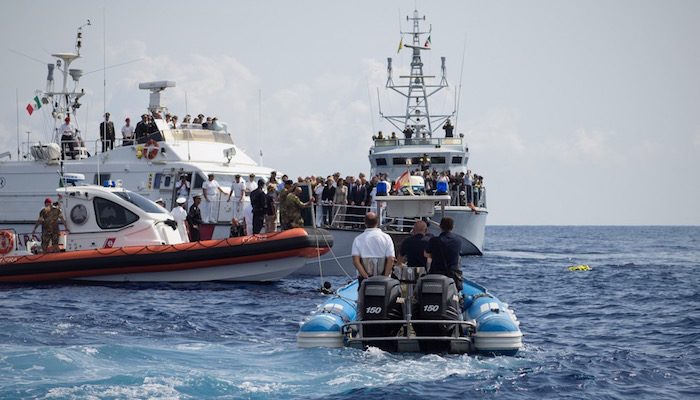
The United Kingdom has announced that it will not support any future search and rescue operations to prevent migrants from drowning in the Mediterranean. This is because, according to a spokesperson for the Home Office, these search and rescue operations act as a “pull factor for illegal migration, encouraging people to make dangerous crossings in the expectation of rescue.” This, the argument goes, leads to traffickers exploiting the situation by using boats unfit to make the crossing.
This is against a background of 150,000 migrants crossing from north Africa and the Middle East in the last 12 months, and 3,000 drowning so far this year.
The Italian government has taken responsibility for patrolling the Mediterranean to intercept these boats but is winding down its operations. The European Union’s Frontex organization will take over but with much fewer resources and so with a far more limited scope. It will not, importantly, have a search and rescue mission.
The morality, logic and evidence behind the United Kingdom’s position are all deeply questionable. We can ask what evidence there is that the search-and-rescue missions carried out by the Italian government since the tragedy of Lampedusa has acted in any way as a pull-factor for migrants crossing the Mediterranean.
What we do know is that there are deeply serious push-factors in north Africa and the Middle East as people flee from appalling economic and political conditions. The fact is that on the face of it those crossing the Mediterranean should be considered as desperate refugees, rather than being portrayed as cynical travelers out to exploit Europe’s sense of mercy – as though they are deliberately placing themselves in great danger to force European nations to rescue them.
Rather than the search-and-rescue missions acting as a pull-factor, the most significant act by Europe is the criminalization of these people – they are seen as ‘illegal’ travelers despite the fact that they all have a serious case for asylum. It is this criminalization of migration that is pushing people into the hands of people smugglers.
All this makes the United Kingdom’s position on search-and-rescue missions one of the most morally corrupt and indefensible stances on migration, and what makes it all the more difficult to stomach is that the government portrays this as being in the interests of these desperate migrants.
We know that to criminalize desperate acts is not the way to help desperate people. The legalization of abortion in the United Kingdom recognized that the main consequence of criminalizing this act was to force people into the hands of illegal providers. The evidence is that in the United Kingdom and United States 15% of all maternal deaths were caused by illegal abortions, abortions are still a major cause of death and injury throughout the world.
Criminalization was not the answer then and it is not the answer now to the movement of people across the Mediterranean. And we have to recognize that it is this act of criminalization which is killing people, not the desire to migrate.
Further Reading on E-International Relations
- Assessing the Responsibility of EU Officials for Crimes Against Migrants in Libya
- Opinion – Venezuela’s Migrants and the Challenges of Trinidad and Tobago
- Opinion – Challenging the European Migration Agenda
- Different Type of Refugee: Onward Journeys of Gulf-Born Migrants from Politically Volatile Countries
- Recognition and Protection of Environmental Migrants in International Law
- Call for Papers – Dignity in Movement: Borders, Bodies and Rights